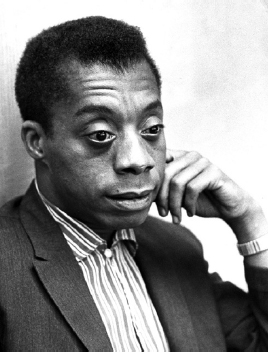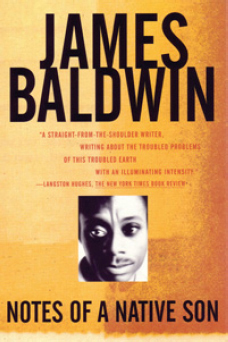19.1 JAMES BALDWIN

JAMES
BALDWIN
James Baldwin was born into poverty in Harlem in 1924; he died in 1987 in France, where he had spent most of his adult life as an expatriate writer. "Once I found myself on the other side of the ocean," Baldwin said, "I could see where I came from very clearly, and I could see that I carried myself, which is my home, with me. You can never escape that. I am the grandson of a slave, and I am a writer. I must deal with both."
As a writer, among his chosen tasks, he took on the responsibility of speaking as a black American (and as a gay black American) about the "Negro problem in America." He did this as a playwright and poet, but most significantly through a series of novels, including Go Tell It on the Mountain (1953), Giovanni's Room (1956), Another Country (1962), Tell Me How Long the Train's Been Gone (1968), If Beale Street Could Talk (1974), Just Above My Head (1979), and Harlem Quartet (1987). And he did it as a prolific essayist, writing for American journals and magazines, including Harper's Magazine, the Partisan Review, Esquire, and The New Yorker. His essays have been collected in several widely read volumes, including Notes of a Native Son (1955), Nobody Knows My Name: More Notes of a Native Son (1961), The Fire Next Time (1963), No Name in the Street (1972), The Devil Finds Work (1976), and The Evidence of Things Not Seen. A selection from his essays was published in 1998 by the Library of America.
The essay that follows, "Notes of a Native Son," was written early in Baldwin's career. (It was first published in Harper's Magazine in November 1955.) It tells the story of his father's death and of the family life that preceded the death. Baldwin had started to write quite early. In a brief autobiographical sketch published in 1955, he said, "I began plotting novels at about the time I learned to read. . . . I read just about everything I could get my hands on - except the Bible, probably because it was the only book I was encouraged to read." He wrote stories and poems, including a short story published in his church newspaper. At fourteen he became a preacher at the Fireside Pentecostal Assembly; at seventeen he stopped preaching, having lost faith that the church was serving the fundamental needs of his community.
After high school he worked in the defense industry, a story he includes in the following essay. In 1944 he met Richard Wright, author of the novel Native Son and one of the most widely read and influential African American intellectuals of the 1940s. Wright helped Baldwin win a fellowship, and with that money Baldwin followed Wright to Paris to work on a novel. (Wright had moved to Paris the year before.) Baldwin developed a difficult relationship with Wright, the successful writer of one generation before. He was a figure Baldwin needed to struggle against, reject, and (in his ambition, at least) surpass. In an odd and difficult essay titled, “Alas, Poor Richard,” Baldwin wrote, “I had made a pilgrimage to meet him because he was the greatest black writer in the world for me. In Uncle Tom’s Children, in Native Son, and, above all, in Black Boy, I found expressed, for the first time in my life, the sorrow, the rage, and the murderous bitterness which was eating up my life and the lives of those around me. His work was an immense liberation and revelation for me. He became my ally and my witness, and alas! my father.”
In 1946 Baldwin returned to the United States: "The fellowship was over, the novel turned out to be unsalable, and I started waiting on tables in a Village restaurant and writing book reviews - mostly, as it turned out, about the Negro problem, concerning which the color of my skin made me automatically an expert." Writing book reviews was the beginning, he said, of his career as an essayist. Later he stated, "I was a black kid and was expected to write from that perspective. Yet I had to realize the black perspective was dictated by the white imagination. Since I wouldn't write from the perspective, essentially, of the victim, I had to find what my own perspective was and then use it. I couldn't talk about 'them' and 'us.' So I had to use 'we' and let the reader figure out who 'we' is."
Baldwin returned again to the United States in 1957, spurred by the revived civil rights movement, and he became one of the most prominent intellectuals writing on the inevitability of racial tension, the possibility of racial understanding, and the consequences of continued conflict. In the essay "Split at the Root," Adrienne Rich said, "Reading James Baldwin's early essays, in the fifties, had stirred me with a sense that apparently 'given' situations like racism could be analyzed and described and that this could lead to action, to change." His collection The Fire Next Time (1963) is a crucial document for any student of American race relations.
In the 1955 autobiographical sketch, Baldwin said:
One of the difficulties about being a Negro writer (and this is not special pleading, since I don't mean to suggest that he has it worse than anybody else) is that the Negro problem is written about so widely. The bookshelves groan under the weight of information, and everyone therefore considers himself informed. And this information, furthermore, operates usually (generally, popularly) to reenforce traditional attitudes. Of traditional attitudes there are only two - For or Against - and I, personally, find it difficult to say which attitude has caused me the most pain. I am speaking as a writer; from a social point of view I am perfectly aware that the change from ill-will to good-will, however motivated, however imperfect, however expressed, is better than no change at all.

But it is part of the business of the writer - as I see it - to examine attitudes, to go beneath the surface, to tap the source. From this point of view the Negro problem is nearly inaccessible. It is not only written about so widely; it is written about so badly. It is quite possible to say that the price a Negro pays for becoming articulate is to find himself, at length, with nothing to be articulate about. (“You taught me language,” says Caliban to Prospero, “and my profit on ’t is I know how to curse.”) Consider: the tremendous social activity that this problem generates imposes on whites and Negroes alike the necessity of looking forward, of working to bring about a better day. This is fine, it keeps the waters troubled; it is all, indeed, that has made possible the Negro’s progress. Nevertheless, social affairs are not, generally speaking, the writer’s prime concern, whether they ought to be or not; it is absolutely necessary that he establish between himself and these affairs a distance which will allow, at least, for clarity, so that before he can look forward in any meaningful sense, he must first be allowed to take a long look back. In the context of the Negro problem, neither whites nor blacks, for excellent reasons of their own, have the faintest desire to look back; but I think that the past is all that makes the present coherent, and further, that the past will remain horrible for exactly as long as we refuse to assess it honestly.
In "Notes of a Native Son," located on the page that follows, Baldwin writes about his father and his family's history, set in relation to the history of the United States - slavery, black migration to the North, the experience of black soldiers in World War II, race riots in Detroit and in Harlem. It certainly has the quality of honesty; it is, in its assessment of father and son, frank and difficult; in its range and ambition, it is a remarkable achievement. One question to ask, as you read it, is whether it was, for Baldwin, a looking back to the past to make the present coherent.